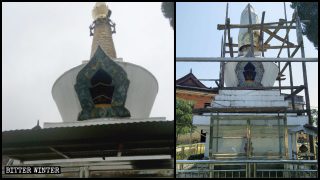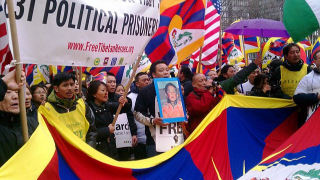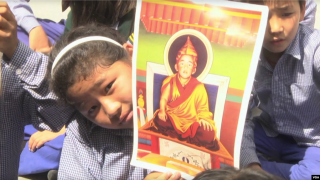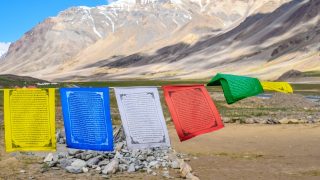Scrap Limits on Former Officials’ Freedom of Religion
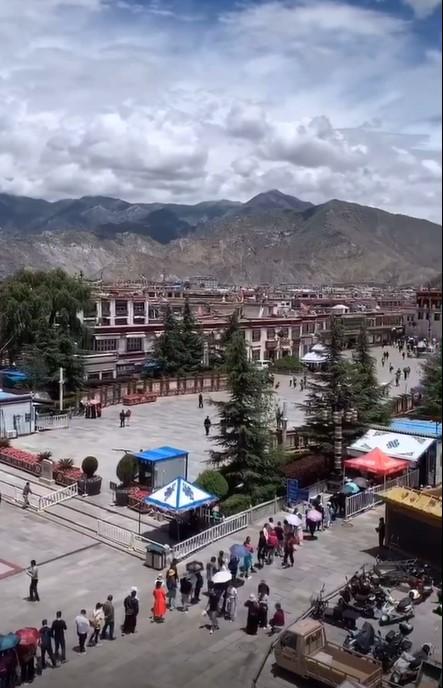
(New York) – A Chinese Communist Party notice banning retired Tibetan government employees from taking part in religious activities violates China’s commitment to religious freedom, Human Rights Watch said today. The notice obtained by Human Rights Watch is undated but appears to have been issued in early August 2019.
The notice requires all Tibet Autonomous Region (TAR) government and party offices in charge of retired government employees – regardless of whether those retirees are party members – to submit a list by August 18 of any “retired personnel performing the kora,” the Tibetan practice of circumambulating a sacred site or temple while reciting prayers or mantras. The practice is a standard form of religious devotion among Tibetan Buddhists, particularly the elderly, for whom it is often a daily religious practice as well as a form of exercise. Punishments would be imposed on those named.
“Chinese government authorities are relentless in their quest to control all aspects of Tibetans’ religious practices,” said Sophie Richardson, China director at Human Rights Watch. “Even those who spent their lives in service to the government aren’t spared.”
The notice was issued by the department under the TAR Party Committee charged with overseeing retired government employees. It instructs the relevant offices “to earnestly carry out a self-inspection, and to conduct a survey to ascertain whether there is such a phenomenon” of retirees performing circumambulations, and whether there are “such personnel among retired cadres and retired Party personnel in local departments and work units.”
The notice states that “retired personnel performing kora are numerous and widespread,” and adds that even some party members are still “openly and semi-openly” involved. Each office had by 12:30 p.m. on August 18 to “submit a written personnel name list and suggestions for sanctions” to impose on retired government workers found doing kora.
Communist Party members throughout China are banned by party regulations from engaging in religious worship or activities. But there is no basis for the party to impose penalties on people, including government workers, who are not party members. Most government employees in the TAR are not party members.
The TAR authorities set up checkpoints in 2008 at the entrance to the major circumambulation sites in the Tibetan capital, Lhasa, and since then have been able to identify Tibetans who perform circumambulations there. Human Rights Watch has learned of at least two current schoolteachers, who are considered government employees, being given oral warnings by their superiors after going through these checkpoints, irrespective of whether their purpose had been religious.
Party orders banning religious activities by retired government employees have been reported informally, particularly during annual religious festivals, but are rarely seen in writing. Although this notice specifically mentions kora, sources in Lhasa confirm that a similar ban applies to any visible religious activity by retired government workers, such as visiting temples and monasteries, participating in prayer assemblies and other events for lay devotees, or making religious donations.
Authorities have previously punished retired government workers found to have engaged in religious activities by reducing or cancelling pensions, medical benefit cards, and other retirement benefits, a Lhasa resident told Human Rights Watch in 2015. In early 2012, the TAR authorities punished several thousand Tibetans, including numerous retired government workers, by temporarily detaining them and subjecting them to “re-education” after they traveled to India on pilgrimage to attend religious teachings by the Dalai Lama in exile.
Because retired government employees depend on government pensions and support, they risk similar penalties for other activities that are not approved by the authorities, the Lhasa resident said: “Whether or not you are a party member, if you do anything untoward, say whatever you feel like, or do things that the officials would not like, the government will cut off your pension, and your free medical care pass.”
TAR leaders introduced the ban on religious activities by government workers after a tightening of policy in the TAR in 1994, and it has been in force ever since. But it was never made explicit that the ban also applied to retirees and not just serving officials. Officials in work unit meetings orally transmitted the ban and it is not known to have been written down. A similar ban on religious activities has applied to schoolchildren and students in the TAR since around 1994.
The current document calling for the punishment of religiously active retirees is part of a new party internal disciplinary campaign known as “Not forgetting the original intention, carry on the mission.” The nationwide campaign, which aims to expose and eliminate any disloyalty among party members, began in June.
Zhu Weiqun, a senior Beijing-based official known for seeking to tighten government control on nationality and religious issues, led a central government inspection team on a tour of the TAR in July. Sources told Human Rights Watch that he led discussions that resulted in the notice. At a meeting with TAR leaders on August 6, Zhu criticized their “inadequate” implementation of an ongoing anti-crime campaign, according to official media. The notice suggests that Zhu had also criticized the TAR leaders for lax oversight of retired government employees. At a meeting to promote the campaign in Lhasa on August 27, top TAR officials called on all party members to follow “strict political discipline and political rules,” and “focus on solving the religious problems of party members.”
Article 36 of the Chinese Constitution provides that “[c]itizens of the People’s Republic of China enjoy freedom of religious belief.” China is a party to several international human rights treaties that endorse the right to freedom of religion and belief.
“Time and again China’s authorities make a mockery of their own claims to respect religious freedom,” Richardson said. “The government should immediately reverse its campaign to punish people for exercising their fundamental rights.”
Source: Human Rights Watch. China: Ban on Tibet Religious Activity Toughened © 2019 by Human Rights Watch.
